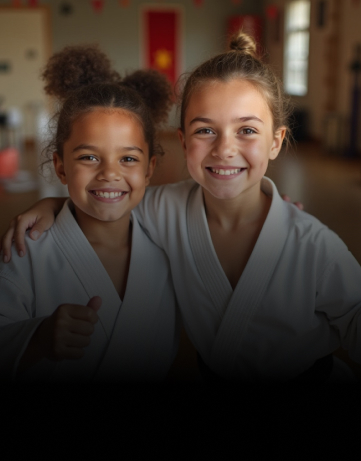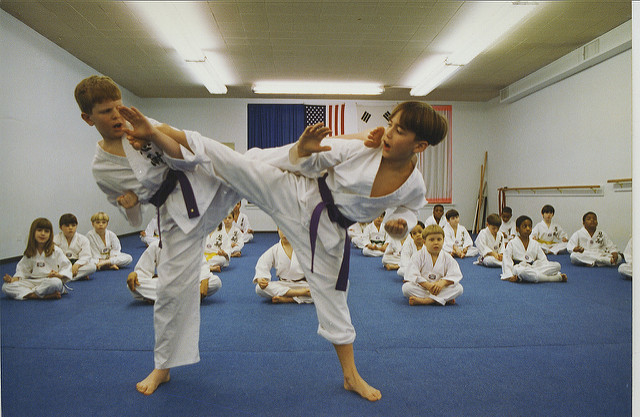Family Martial Arts – Activities that Bring Parents and Kids in Harmony
Family Martial Arts – Activities that Bring Parents and Kids in Harmony
Blog Article
How Martial Arts for Kids Can Increase Confidence and Discipline in Young Martial Artists
Karate for youngsters provides a distinct opportunity to develop confidence and self-control in young martial musicians. As they find out new strategies and face obstacles, they not just get skills however also create a strong sense of self-respect. This organized setting encourages them to value the trip of improvement. Exactly how does this training convert into their everyday lives? Discover the much deeper links that make karate greater than just a sport.
The Relevance of Confidence in Childhood Years Development
Self-confidence is an important foundation in childhood advancement. When you nurture your youngster's self-worth, you encourage them to deal with difficulties, take dangers, and share themselves freely. Kids with confidence are much more happy to explore social scenarios and brand-new tasks, which can lead to lasting friendships and valuable experiences.Encouraging your youngster to tip out of their comfort zone cultivates resilience. They discover that failure isn't completion yet instead a tipping stone to success. By celebrating their accomplishments, regardless of just how little, you help them recognize their capabilities and worth.In this journey, assistance and positive reinforcement from you play a crucial role. Whether it's via appreciation or merely existing, your involvement enhances their confidence. As they grow, this self-assurance comes to be a long-lasting property, outfitting them to navigate both obstacles and chances with a solid sense of self.
Just How Karate Instructs Discipline and Focus
Martial arts assists you construct technique and emphasis through its structured training program. As you exercise mindfulness during each session, you'll find out to concentrate much better both on and off the floor covering. And also, establishing and attaining objectives in martial arts reinforces your capability to remain alert and committed.
Structured Training Regimen
While you take part in karate training, you'll rapidly uncover just how a structured regimen infuses self-control and emphasis in young professionals. Each course follows a particular format, including warm-ups, strategy method, and sparring. This consistency teaches you to devote and respect the process to renovation. As you learn types and strategies, you establish a feeling of responsibility for your own progress.The structured environment encourages you to set objectives, whether understanding a brand-new belt or perfecting a kata. You'll find that staying concentrated during drills and classes develops your focus. The self-control you grow in martial arts prolongs past the dojo, positively affecting your schoolwork and daily routines. Each session strengthens the importance of dedication, aiding you turn into a much more disciplined individual.
Mindfulness in Technique
As you practice martial arts, you'll locate that mindfulness becomes a vital part of your training. Each move needs your complete attention, aiding you stay concentrated on today minute. You'll learn to tune out distractions and focus on your breathing, activities, and intents. This increased recognition sharpens your reflexes and enhances your discipline.During sparring or forms, you'll discover the value of being psychologically present - Karate Salisbury MD. You'll observe how this emphasis not only enhances your method but additionally develops your confidence. By practicing mindfulness in martial arts, you cultivate persistence and resilience, crucial attributes that prolong beyond the dojo. This way, karate teaches you to harness your mind, assisting you develop a disciplined approach to difficulties both on and off the floor covering

Personal Goal Setting Techniques
Setting objectives in martial arts isn't simply regarding gaining belts; it's an effective method to cultivate self-control and focus. When you set particular, achievable targets, you create a roadmap for your progress. Rather of just intending to improve your kicks, attempt focusing on understanding a specific strategy each month. This method keeps you inspired and engaged.Breaking down bigger objectives into smaller, workable actions aids you track your progression and commemorate little victories in the process. Whether it's improving your position or enhancing your sparring endurance, every objective strengthens your commitment. As you attain these objectives, you'll construct confidence in your skills and create a strong sense of discipline that expands beyond the dojo into day-to-day life.
Building Resilience Through Martial Arts
Martial arts, specifically karate, uses youngsters a special opportunity to construct resilience in a helpful atmosphere. In courses, they deal with difficulties that press their limits, whether it's mastering a new method or sparring with a companion. Each setback, like a missed kick or a lost suit, ends up being a possibility to learn and grow.As they exercise, kids find out to embrace discomfort and keep attempting, also when points obtain challenging. They uncover that failing isn't completion; it belongs to the journey. This frame of mind assists them recuperate stronger, not just in the dojo, however in day-to-day life.With each challenge they conquer, your youngster builds confidence in their capacity to deal with barriers, fueling their determination. With martial arts, they'll understand that durability isn't simply concerning physical strength; it's concerning psychological grit and perseverance, empowering them to encounter whatever life tosses their method.
The Function of Regard in Karate Educating
Respect is a fundamental principle in karate training, promoting a culture of discipline and friendship among trainees. When you tip onto the dojo flooring, you're not simply learning strategies; you're likewise learning to respect your trainers, peers, and the art itself (Karate Salisbury MD). Bowing at the start and end of course isn't just a rule; it signifies your acknowledgment of others' initiatives and dedication.As you establish common regard, you'll discover it improves your knowing experience. You'll pay attention more diligently to your trainer and gain insights from fellow pupils. This setting encourages constructive criticism and assistance, permitting every person to expand together.Moreover, regard grows self-discipline. Identifying the worth of effort and humility helps you stay focused on your training. In turn, this respect converts into your daily life, improving your communications and partnerships outside the dojo. Through martial arts, you discover that respect is vital for individual growth and community building
Attaining and establishing objectives Success in Martial arts

Social Skills and Teamwork in the Dojo
While training in the dojo, children naturally create essential social skills and team effort abilities. As they exercise together with peers, they discover to interact effectively, share room, and assistance each other. Each class presents chances for cooperation, whether it's throughout partner drills or team exercises. This synergy promotes relationships and creates a sense of belonging, making the dojo a nurturing environment.Kids likewise acquire valuable problem resolution abilities. When they encounter difficulties, such as arguments throughout sparring, they find out to navigate these scenarios constructively. They exercise persistence and empathy, understanding that every person has different strengths and weaknesses.Moreover, taking part in group activities grows a sense of liability. You'll see your kid finding out to depend on colleagues and take duty for their duty in a team. These experiences not just boost their martial arts trip but also furnish them with social tools they'll carry right into various other locations of life.

The Long-Term Conveniences of Karate Beyond Childhood
As children grow up and shift right into their adult years, the go to my site advantages of karate expand much beyond the dojo. You'll locate that the discipline and emphasis found out through karate can equate into your professional and academic life. Establishing and accomplishing objectives in fighting styles fosters a strong job principles, which can push you to stand out in any endeavor.Moreover, the confidence got from understanding strategies and competing can improve your self-esteem, helping you take on obstacles head-on. This durability ends up being invaluable as you deal with the unpredictabilities of adulthood.Additionally, the social hockey games today skills developed with synergy and camaraderie in the dojo can bring about better partnerships in both individual and expert balls. You'll discover to connect efficiently, willpower conflicts, and develop a helpful network.Ultimately, karate shapes not just experienced martial musicians, yet all-around people ready to take on the world.
Often Asked Questions
What Age Is Best to Beginning Martial Arts for Children?
You can start karate as very early as age 4 or five, but it typically relies on your youngster's maturity and rate of interest. Finding a course that matches their age and energy level makes a huge distinction.
Exist Any Type Of Health And Wellness Conveniences From Practicing Karate?
Yes, practicing karate deals many wellness advantages. You'll enhance your stamina, flexibility, and sychronisation while improving cardiovascular health and fitness. And also, it boosts focus and psychological health, making it a wonderful selection for total physical and mental health.
Exactly How Usually Should Youngsters Go To Karate Courses?
You ought to motivate your kids to attend karate courses at least 2 to 3 times a week. Consistency aids them learn strategies efficiently and develop skills, making their experience a lot more delightful and gratifying in the future.
Can Karate Assist With Managing Anxiety in Children?
Yes, martial arts can aid manage stress and anxiety in kids. It teaches focus and self-control while supplying a risk-free outlet for energy. You'll observe your child growing more positive and calm as they exercise consistently.
What Equipment Is Required for Children Beginning Karate?

Report this page